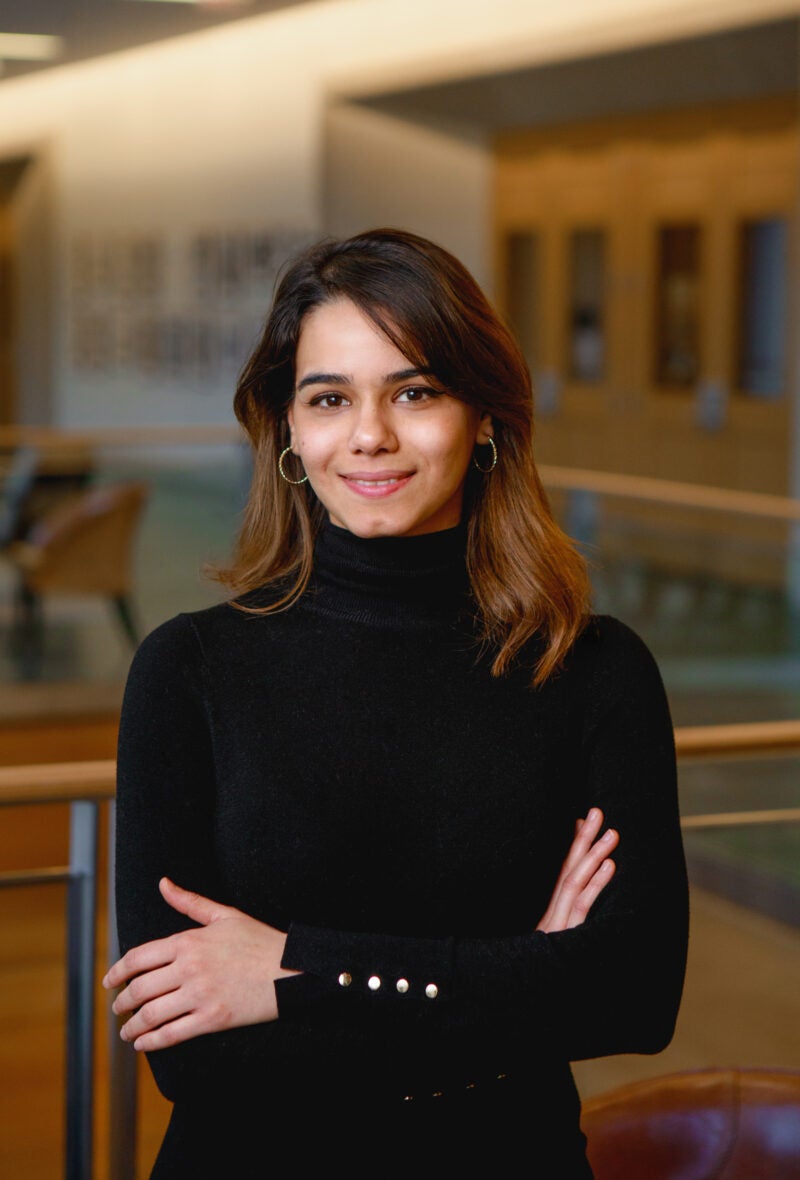Khawla Yassin Nassar LL.M. ’23 is a Palestinian Israeli lawyer. She completed her Bachelor of Laws degree at Tel Aviv University, graduating magna cum laude and securing teaching assistant positions. Before coming to Harvard, she worked as an associate lawyer in the Dispute Resolution and Litigation department at Meitar Law Offices. Previously, Nassar was a clerk for Justice Daphne Barak Erez in the Supreme Court of Israel. In addition to her professional career, she was a member of local feminist non-profit organizations that support and advocate for Palestinian women.
What brought you to HLS?
I am interested in an academic career in the near future. Harvard Law School, at the forefront of research on law, technology and human rights – my areas of interests – is the best possible place for me to begin this career. The privilege to learn from, and work with the finest scholars, as well as the privilege to enjoy the rich interdisciplinary research centers here like Berkman Klein Center for Internet and Society would perfectly suit my research agenda.
Tell me about your current work.
Before coming to Harvard, I worked as an associate lawyer in the dispute resolution and litigation department at Meitar Law Offices, in Tel Aviv. Together with my team, we represented technology companies in large-scale civil and commercial litigation regarding privacy, consumer protections and more.
Alongside my academic background, my practice at Meitar has shown me how practice and theory illuminate one another. It made me eager to pursue an academic career aiming to explore new theoretical avenues dealing with the complex, fascinating intersection of law, society, technology, and human rights.
It seems like law and technology is an area of focus for you. Why is that interesting to you?
Israel is a developed country in terms of technology. Nevertheless, some of technological advantages are being used in ways that abuse the rights of Palestinians, especially in the Occupied Territories. The abuses take different shapes, ranging from conducting a large mass surveillance to obscuring Palestinian narratives on social media platforms. As a Palestinian myself, I believe there’s a personal responsibility to focus on these violations, to study and understand how existing legal and social structures allow them, and eventually to think of ways to prevent them.
These women, mothers, family members, friends, colleagues and mentors, give me inspiration, and thanks to them – to all of them – I’m here.
Tell me more about your interest in academia.
I believe (and I hope) that academia is one of the most influential institutions, especially in Palestine-Israel, that can push for a change. It gives you a chance to think thoroughly of issues that trouble you and find solutions. It also grants you the ability to work with and learn from intelligent scholars and researchers.
Would you like to stay in the area of law and technology?
I believe that being a good scholar demands that you demonstrate knowledge and expertise in a wide range of research areas. Maybe as a young scholar, it’s better to focus on one area of research, but in the long run I will always be open to discover new and important ones.
What are what are some of the motivations that drive you to do what you do?
There’s a beautiful line in the Combahee River Collective Statement [a founding document of contemporary Black feminism], that says: “We struggle together with Black men against racism, while we also struggle with Black men about sexism.” I think this line resonates perfectly with the struggles of Palestinian women, and therefore the motivation that these struggles grant them.
The combination of experiences of racism and sexism that affect Palestinian women’s lives is reflected, among other things, in their underrepresentation in important positions and their exclusion from decision-making junctures. For me personally, as for other Palestinian women citizens of Israel, this is only a motivation to work harder in combating these gender and ethnic discriminations and secure a seat on the table.
Are there any women in your family or friends who have served as inspiration to you?
Luckily, I’m always surrounded by strong, supportive, feminist, and ambitious women, whether in my personal or professional life. These women, mothers, family members, friends, colleagues and mentors give me inspiration, and thanks to them – to all of them – I’m here.
Want to stay up to date with Harvard Law Today? Sign up for our weekly newsletter.
